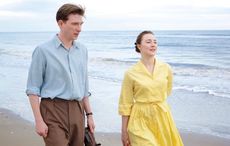IrishCentral has recently learned that Natasha Richardson’s silver screen send-off consists of a straight-to-DVD flick.
The last project Richardson filmed before her tragic sudden death in March was “Wild Child,” a teen comedy starring Julia Roberts’ niece Emma Roberts.
Richardson plays Mrs. Kingsley, the headmistress of an English boarding school where a rich, spoiled girl from Malibu named Poppy (Roberts) is sent to by her father (Aidan Quinn).
The film was met with less-than-glowing reviews in Britain, described by Time Out London as “one for the youngest and most forgiving of teenage girls.”
Does the movie sound original? Certainly not. Does it seem like it’s going to be sappy and stereotypical? Probably.
But when movies like “The Proposal” and “I Love You, Beth Cooper,” both romantic comedies with overdone, stereotypical plotlines, are being headlined at theaters, how dare the U.S. fail to give “Wild Child” the spotlight it deserves, being that it is Natasha’s last film project.
Some feel that Richardson should be remembered for her more critically acclaimed roles in films like “The Comfort of Strangers” and “Widows’ Peak,” and award winning stage roles in “Anna Christie” and “Cabaret.”
But let’s not forget that it was Richardson’s roles in teen flicks and romcoms like “The Parent Trap” and “Maid in Manhattan” that introduced her to an entirely new generation, and made her a much-loved, more recognizable face in America.
In light of this fact, why would we brush aside “Wild Child,” even if it didn’t capitalize on the actress’ talent, or is the best of her work?
The point is “Wild Child” is Richardson’s final film, and therefore the public’s only chance to see the amazing actress on the big screen for the last time.
To deny her American fans this privilege is simply wrong, and insensitive.
Heath Ledger, another amazingly talented actor who died far too young, passed away a year before Richardson, and yet we’re constantly about “The Imaginarium of Doctor Parnassus” and hyping it up simply for the fact that it was his last film.
Sure, Ledger’s movie seems more promising than Richardson’s, but the significance of both films are equal: they feature the final screen time that either of these beautiful actors can offer us.
To degrade Richardson’s last project in such a way is shameful. We should celebrate her last film role, no matter what the caliber of the film.




Comments